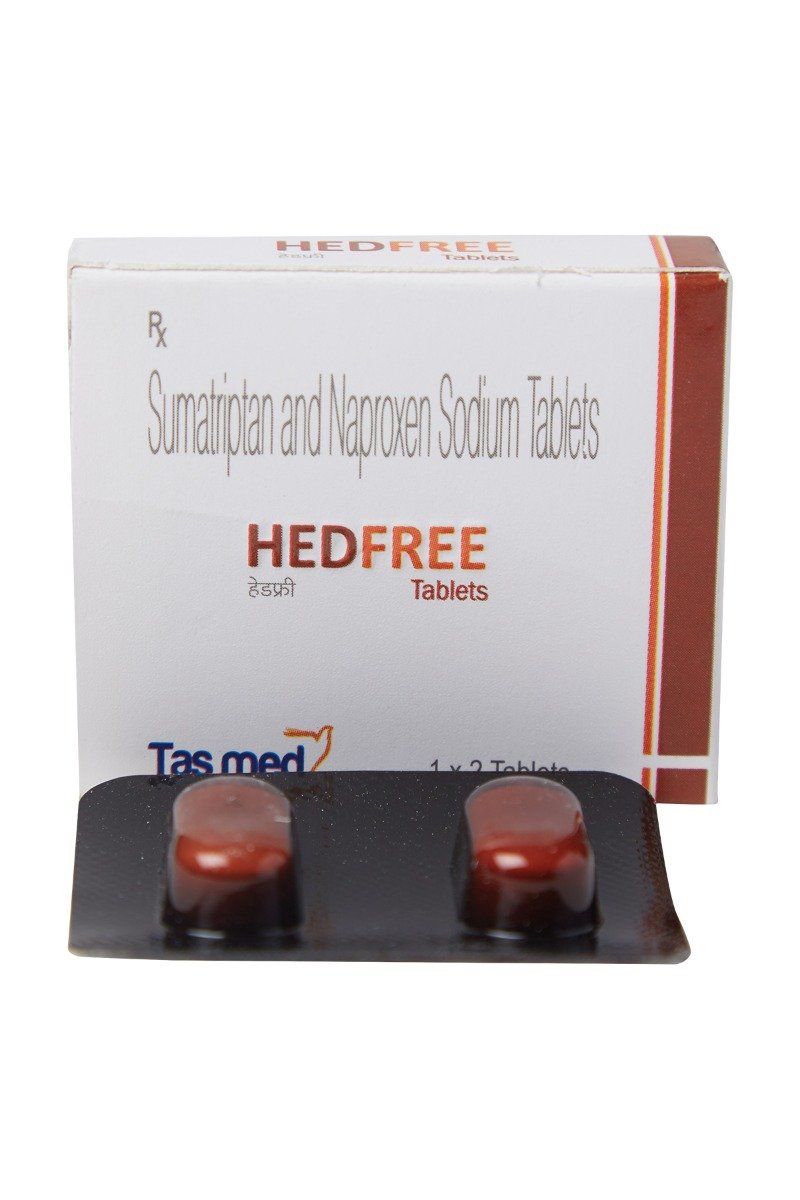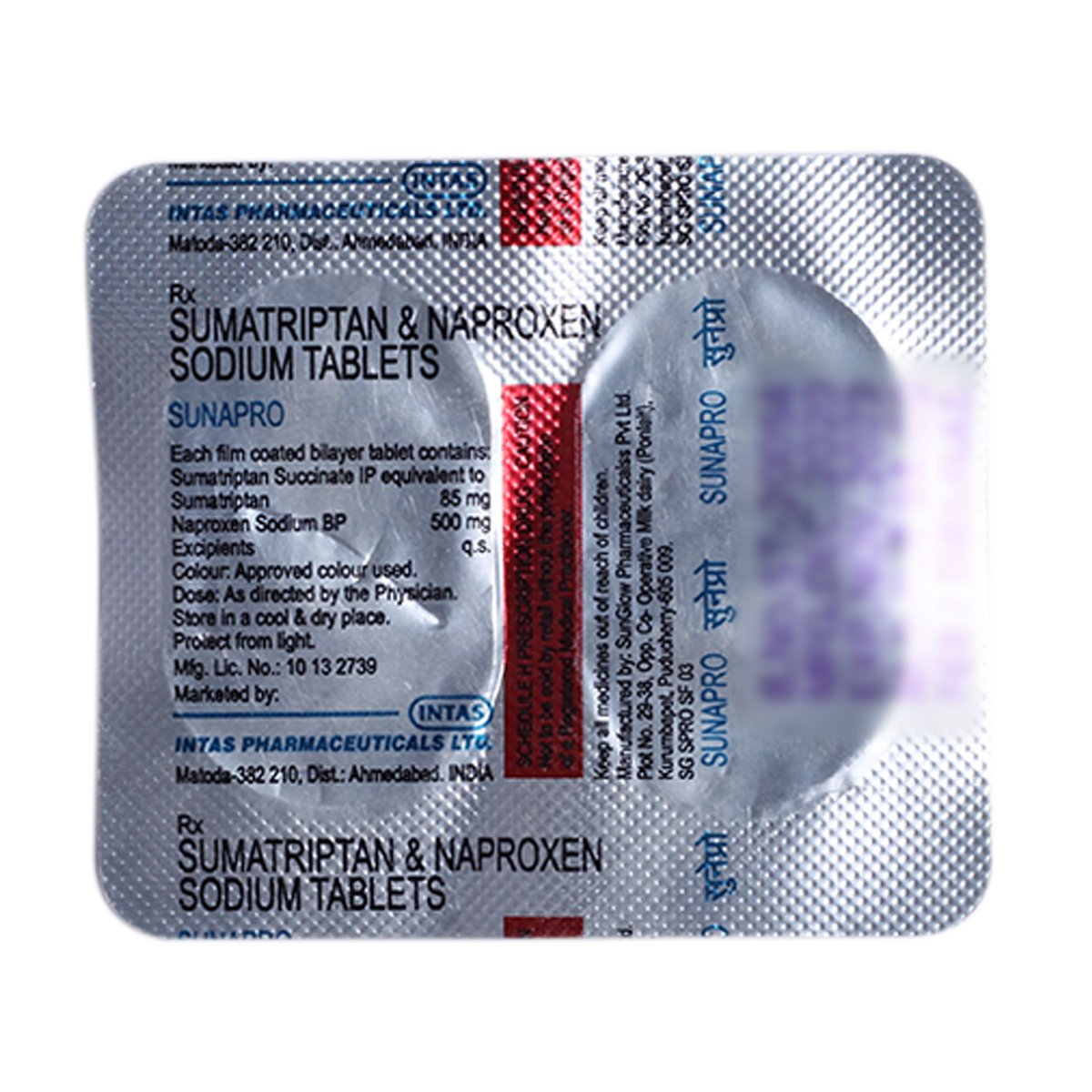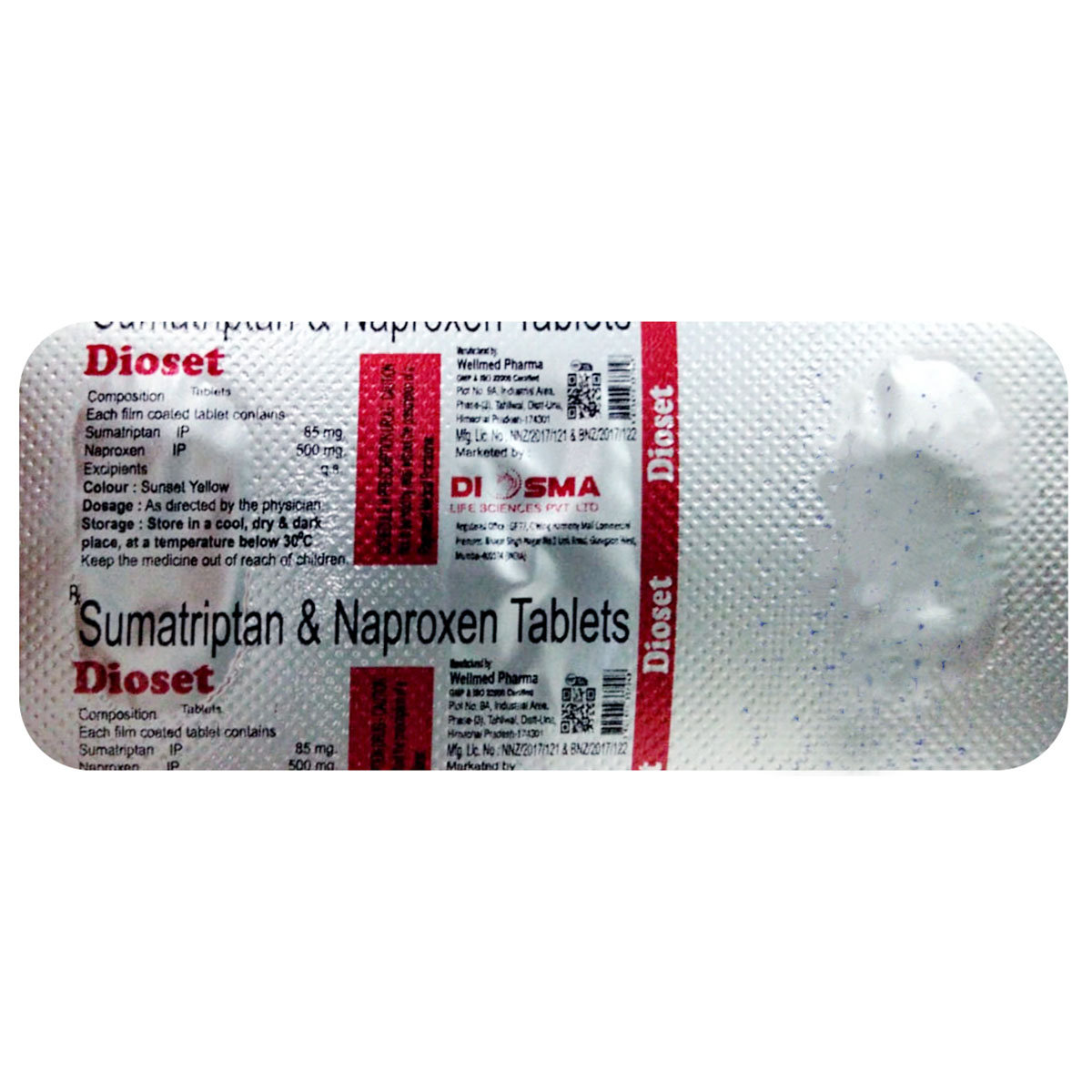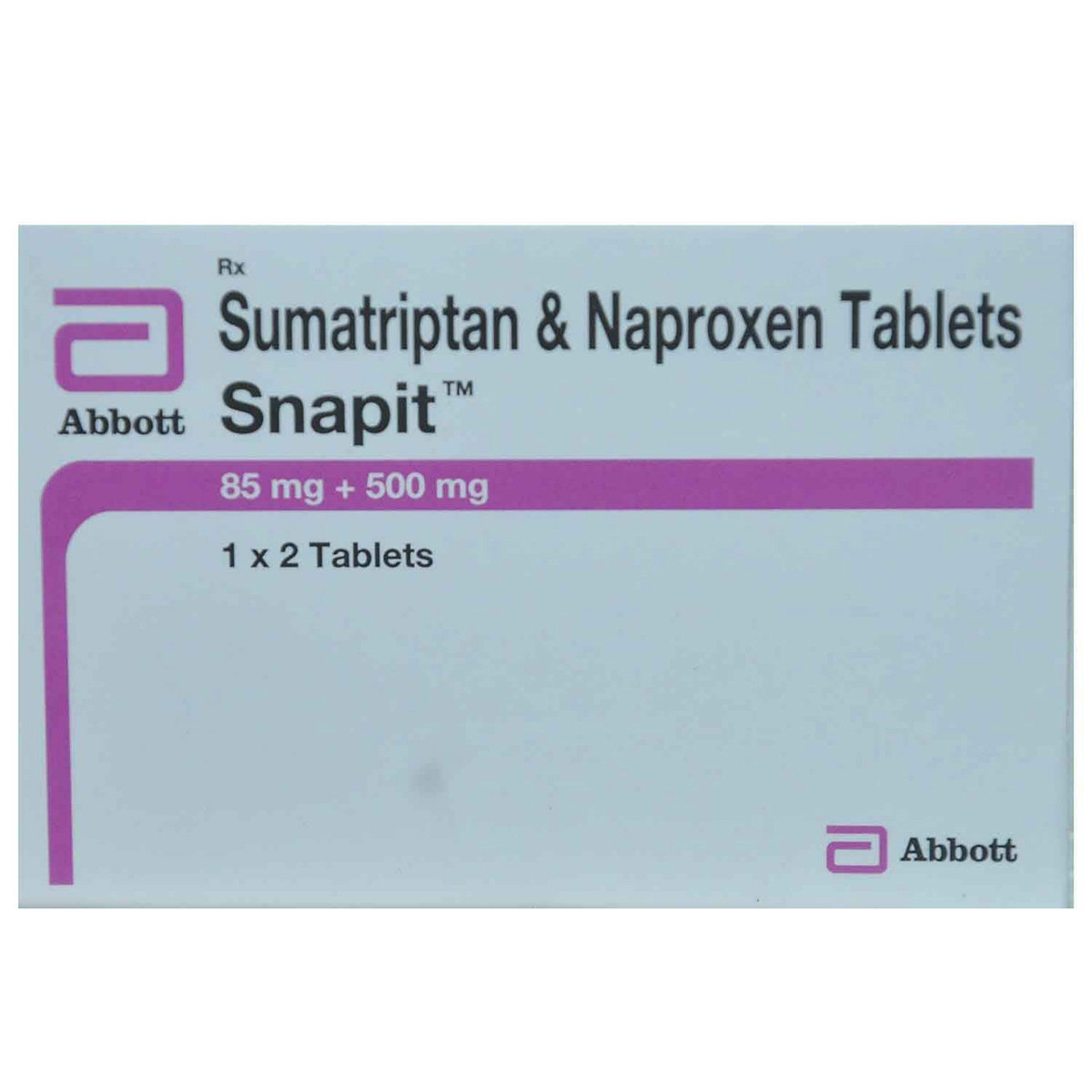- Home
- Sumalgia Tab
Sumalgia Tab Substitute
Sumalgia Tab Substitute
Medicine Composition:
NAPROXEN-500MG + SUMATRIPTAN-85MGAll Substitutes & Brand Comparisons
RX
Out of StockNaprosuma Tablet 2's
La Renon Healthcare Pvt Ltd
₹86
(₹38.7 per unit)
8% CHEAPERRX
Out of StockNapcet Tablet
₹137
(₹41.1 per unit)
2% CHEAPERRX
Out of StockFyn-Head Tablet
Gonan Pharma
₹189
(₹42.53 per unit)
1% COSTLIERRX
Somatran N Tablet 4's
Alteus Biogenics Pvt Ltd
₹219.5
(₹49.4 per unit)
17% COSTLIERRX
Hedfree Tablet 2's
Tas Med India Pvt Ltd
₹110
(₹49.5 per unit)
17% COSTLIERRX
Out of StockNapcet Tablet 4's
Adn Lifesciences Pvt Ltd
₹199.08
(₹49.77 per unit)
18% COSTLIERRX
Sunapro Tablet 2's
Intas Pharmaceuticals Ltd
₹114.5
(₹51.55 per unit)
22% COSTLIERRX
Naprosyn M Tablet 2's
RPG Life Sciences Ltd
₹117.5
(₹52.9 per unit)
25% COSTLIERRX
Out of StockNapaxin Gold Tablet 6's
Matias Healthcare Pvt Ltd
₹327
(₹54.5 per unit)
29% COSTLIERRX
Dioset Tablet 2's
Diosma Lifesciences Pvt Ltd
₹129
(₹58.05 per unit)
37% COSTLIERRX
Niprameg-S Tablet 4's
Megma Healthcare Pvt Ltd
₹233
(₹58.25 per unit)
38% COSTLIERRX
Macprox S Tablet 2's
Macleods Pharmaceuticals Ltd
₹138
(₹62.1 per unit)
47% COSTLIERRX
Snapit Tablet 2's
Abbott India Ltd
₹144
(₹64.8 per unit)
53% COSTLIERRX
Vasograin Plus Tablet 10's
Cadila Pharmaceuticals Ltd
₹655
(₹65.5 per unit)
55% COSTLIERRX
Sumatrina Tablet 2's
Arinna Lifesciences Ltd
₹143.5
(₹71.75 per unit)
70% COSTLIER

When Should You Consider Switching from Sumalgia Tab?
Patients may explore substitutes in the following scenarios:
- High monthly cost of Sumalgia Tab
- Non-availability in local pharmacies
- Generic recommendation by a doctor
- Side effects or better tolerability with alternatives
What to Know Before Switching
Before you switch from Sumalgia Tab to another medicine, here are some important points to keep in mind:
Same salt, different brands:
Most substitutes contain the same active ingredient - NAPROXEN-500MG + SUMATRIPTAN-85MG, but the fillers, coating, or manufacturing quality may vary slightly.
Consult your doctor first:
Even if the salt is the same, your doctor can confirm if the substitute is right for your condition, dosage, and health history.
Watch out for allergies or reactions:
Some people may react differently to certain brands due to inactive ingredients. If you notice any side effects, inform your doctor immediately.
Price ≠ effectiveness:
A lower-priced substitute doesn't mean it's less effective. Many generic medicines work just as well as branded ones.
Check the dosage form and strength:
Always match the substitute’s strength (e.g., 5mg, 10mg) and form (tablet, capsule, syrup) with what your doctor prescribed.
Uses
Sumalgia Tab is used in the treatment of migraine. The detailed uses of Sumalgia Tab are as follows:
- Treats Migraine Headaches: Sumalgia Tab effectively treats acute migraine attacks with or without aura by narrowing the swollen blood vessels around the brain and by blocking the effect of chemical messengers that cause pain.
- Relieves Migraine-Associated Symptoms: Sumalgia Tab helps relieve symptoms such as nausea, vomiting, headache, and sensitivity to light and sound.
Medicinal Benefits
Sumalgia Tab is a combination of two drugs, Sumatriptan and Naproxen. Sumalgia Tab is indicated for the acute treatment of migraine with or without aura. Sumatriptan is a serotonin receptor agonist that acts on the serotonin (5-HT) receptors located in the brain, which causes the narrowing of the brain's blood vessels, thereby affecting the blood flow patterns with a headache. Naproxen is a pain killer which works by blocking the effect of a chemical messenger known as cyclo-oxygenase (COX) enzymes that make other chemical prostaglandins. By blocking the effect of COX enzymes, fewer prostaglandins are produced, thereby reducing pain in migraine.
FAQs
The substitutes of Sumalgia Tab contain the same active salt(s) - NAPROXEN-500MG + SUMATRIPTAN-85MG. However, they may differ in price, manufacturing quality, and inactive ingredients. Speak to your doctor to find a suitable option.
Switching to a generic substitute medicine in the place of Sumalgia Tab is often possible if it has the same salt, strength, and dosage form. But always check with your doctor before making any changes to your medication.
Generics versions of Sumalgia Tab are typically more affordable because they don’t include the original brand's research, development, and marketing costs. They contain the same active ingredient and are approved for safety and effectiveness.
Most people don’t notice any difference. However, some may react to different fillers or coatings. If you notice any unusual symptoms after switching, consult your doctor.
Make sure the new medicine has the same active salt, strength, dosage form. Always confirm the change with your doctor or pharmacist.
Substitutes of Sumalgia Tab meet the same safety and efficacy standards as Sumalgia Tab, but small differences in absorption or formulation can exist. A doctor can help you choose the right one for your needs.
Yes. Substitutes of Sumalgia Tab may vary in color, size, or shape due to differences in manufacturing and branding, but this does not affect how they work.
Yes, it’s generally safe to switch between multiple substitutes of Sumalgia Tab if they have the same salt and strength. However, always inform your doctor so they can monitor how your body responds.
Yes, many people safely use substitutes of Sumalgia Tab for long-term treatment. Just ensure it’s done under medical supervision.
If your symptoms stay under control or lab results remain stable, the substitute for Sumalgia Tab is likely working well. Regular follow-ups with your doctor are important.
Absolutely. Even with the same salt, small differences can affect how your body responds when switching from Sumalgia Tab to its substitute. Always consult your doctor before switching.
Sumalgia Tab is used to prevent migraine symptoms such as headache, nausea, and vomiting.
Sumalgia Tab contains Sumatriptan and Naproxen. Sumatriptan acts on the serotonin (5-HT) receptors located in the brain; this causes the narrowing of the blood vessels in the brain and also affects the blood flow patterns associated with headaches. Naproxen works by blocking the effect of chemical messengers that cause pain.
Dry mouth could be a side-effect of Sumalgia Tab. Limiting caffeine intake, avoiding smoking and mouthwashes containing alcohol, drinking water regularly, and chewing sugar-free gum/candy might help stimulate saliva and thereby prevents drying of the mouth.
Sumalgia Tab treats a headache that has already begun but does not prevent or reduce the attacks. Sumalgia Tab should not be used to treat cluster headache or other types of headache, which may cause loss of movement on one side of the body.
Sumalgia Tab contains Naproxen, an NSAID. Therefore, consult your doctor before taking any pain killer medicines, fever-reducing medicines, medicines for cold or sleeping problems along with Sumalgia Tab as they may also contain NSAID.
Talk to your doctor before taking Sumalgia Tab with anti-hypertensive medicines as they may cause impaired response when taken with painkiller. Regular monitoring of blood pressure levels is advised while taking Sumalgia Tab if you have high blood pressure. Sumalgia Tab should not be taken if you have uncontrolled high blood pressure.
Sumalgia Tab contains painkiller, which might increase the risk of gastrointestinal adverse effects such as ulceration, bleeding, and perforation of intestines or stomach. Therefore, consult your doctor if you have stomach ulcers.
Do not take a dose higher than the recommended dose of Sumalgia Tab. Taking more can lead to serious side effects like heart attack, stroke, bleeding, and stomach ulcers. Always follow your doctor's instructions. If your migraines persist, consult your doctor for a revised treatment plan to avoid harmful self-medication.
Store Sumalgia Tab in its original container, keeping it cool, dry, and out of sunlight. Keep it out of the reach of children. Regularly check the expiration date. When you need to dispose of the medicine, remove the label, place it in a plastic bag, and throw it away in the household trash. Remember, never flush the medicine down the toilet or sink to prevent harm to others and the environment.
Sumalgia Tab can cause sleepiness as a common side effect. Drowsiness affects up to 30% of naproxen users and 17% of sumatriptan users. Combining these medications may increase sedative effects. To minimize sleepiness, take the medication as directed, avoid operating heavy machinery or driving, and consider taking it at bedtime if prescribed once daily. If sleepiness persists or worsens, consult your doctor.
You can stop taking Sumalgia Tab once your migraine symptoms are relieved. However, always follow your doctor's instructions and consult them before stopping or adjusting the medication. If migraines persist, consult your doctor for further guidance.
Various factors, including stress, hormonal changes, certain foods, sleep disturbances, physical exertion, weather changes, and medical conditions can trigger migraines. Common triggers include chocolate, cheese, citrus fruits, bright lights, and loud noises. Identifying and managing your personal triggers can help reduce migraine frequency and severity.
The common side effects of Sumalgia Tab include dizziness, sleepiness, nausea, chest discomfort, dry mouth, irregular heartbeat, and heartburn. These side effects are usually mild and temporary, resolving as your body adjusts to the medication. However, if any side effects persist or worsen, it's essential to consult your doctor for proper guidance and care.
Sumalgia Tab should be used only during the first and second trimesters of pregnancy if the benefits outweigh the risks. Sumalgia Tab should not be taken during the third trimester of pregnancy.
Sumalgia Tab should not be given to children as safety and effectiveness were not established.
Migraine is a neurological condition which is characterised by an intense, debilitating headache. Hormonal changes, stress, lack or excess of sleep, bright lights, loud sounds, and certain foods and drinks can trigger migraine headaches.
Taking more than the recommended dosage does not provide additional pain relief and can increase the risk of adverse effects.
Buy best C.n.s Drugs products by
Intas Pharmaceuticals Ltd
Sun Pharmaceutical Industries Ltd
Torrent Pharmaceuticals Ltd
Alkem Laboratories Ltd
Alteus Biogenics Pvt Ltd
Abbott India Ltd
Cipla Ltd
Micro Labs Ltd
Lupin Ltd
Tripada Healthcare Pvt Ltd
D D Pharmaceuticals Pvt Ltd
Ipca Laboratories Ltd
Arinna Lifesciences Ltd
Icon Life Sciences
Linux Laboratories Pvt Ltd
Mankind Pharma Pvt Ltd
Cnx Health Care Pvt Ltd
East West Pharma India Pvt Ltd
La Renon Healthcare Pvt Ltd
Eris Life Sciences Ltd
Emcure Pharmaceuticals Ltd
Leeford Healthcare Ltd
Talent India Pvt Ltd
Tas Med India Pvt Ltd
Consern Pharma Ltd
Macleods Pharmaceuticals Ltd
Zydus Healthcare Ltd
Jagsam Pharma
Troikaa Pharmaceuticals Ltd
Dr Reddy's Laboratories Ltd
Ikon Pharmaceuticals Pvt Ltd
Sigmund Promedica
Matias Healthcare Pvt Ltd
Aristo Pharmaceuticals Pvt Ltd
Ardent Life Sciences Pvt Ltd
Shine Pharmaceuticals Ltd
Zydus Cadila
Theo Pharma Pvt Ltd
Wockhardt Ltd
Propel Healthcare
Lifecare Neuro Products Ltd
Crescent Formulations Pvt Ltd
Reliance Formulation Pvt Ltd
Mesmer Pharmaceuticals
Matteo Health Care Pvt Ltd
Morepen Laboratories Ltd
Capital Pharma
Neon Laboratories Ltd
Ajanta Pharma Ltd
Med Manor Organics Pvt Ltd
Lyf Healthcare
Msn Laboratories Pvt Ltd
Sanix Formulation Pvt Ltd
Akumentis Healthcare Ltd
Brainwave Healthcare Pvt Ltd
Pulse Pharmaceuticals
Hetero Healthcare Pvt Ltd
Sanofi India Ltd
Solvate Laboratories Pvt Ltd
Cyrus Remedies Pvt Ltd
Elder Pharmaceuticals Ltd
Novartis India Ltd
Psyco Remedies Ltd
Medishri Healthcare Pvt Ltd
Alniche Life Sciences Pvt Ltd
Crescent Therapeutics Ltd
Hbc Life Sciences Pvt Ltd
Mova Pharmaceutical Pvt Ltd
Quince Lifesciences Pvt Ltd
Cadila Healthcare Ltd
Prevego Healthcare & Research Pvt Ltd
Tripada Lifecare Pvt Ltd
Alembic Pharmaceuticals Ltd
Talin Remedies Pvt Ltd
Kivi Labs Ltd
Serotonin Pharmaceuticals Llp
Solis Pharmaceuticals
Glenmark Pharmaceuticals Ltd
Infivis Life Care
Trion Pharma India Llp
A N Pharmacia Laboratories Pvt Ltd
Gagnant Healthcare Pvt Ltd
Primus Remedies Pvt Ltd
Crescent Pharmaceuticals
Glarizonto Pharma Pvt Ltd
Knoll Healthcare Pvt Ltd
Zuventus Healthcare Ltd
Arches Pharmaceuticals
Cadila Pharmaceuticals Ltd
Lia Life Sciences Pvt Ltd
Lyceum Life Sciences Pvt Ltd
USV Pvt Ltd
Vasu Organics Pvt Ltd
Wallace Pharmaceuticals Pvt Ltd
Corona Remedies Pvt Ltd
Glial Life Science Llp
Lincoln Pharmaceuticals Ltd
Maneesh Pharmaceuticals Ltd
Pfizer Ltd
Suraksha Pharma Pvt Ltd








